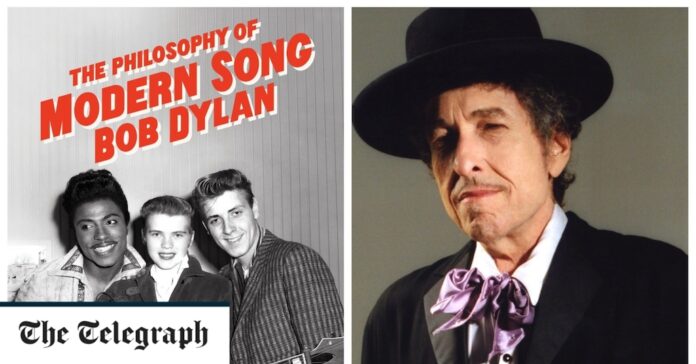The Nobel Prize-winning songwriter ducks and dives through these brilliant, surprising essays on 66 of his favourite songs
When the most revered singer-songwriter of all time delivers a hefty tome about the art of song, you sit up and take notice. Yet surely no one will be surprised to learn that Bob Dylan’s mischievously titled The Philosophy of Modern Song barely pretends to offer a coherent treatise on the state of contemporary songcraft. Rather, its lavishly and wittily illustrated 340 pages are an excuse for the great man to write with joyful zest, piercing profundity and flamboyant imagination about whatever crosses his mind, using an odd assortment of recorded favourites from a lifetime’s listening as jumping off points for stirring, startling and frequently laugh-out-loud riffs on art and life.
There are 66 essays, generally opening with impressionistic encapsulations of what a particular record means to Dylan, followed by more measured if eccentrically off-beat thoughts on the artist, the genre or some related lyrical theme, all of which should be taken with at least a pinch of salt. “Sometimes people ask songwriters what a song means, not realizing if they had more words to explain it they would’ve used them in the song,” Dylan drily notes in an appreciation of Keep My Skillet Good ‘n Greasy by Uncle Dave Macon from 1924, the oldest recording in the book.
The most recent song to have caught Dylan’s fancy is Warren Zevon’s Dirty Life and Times, from 2003, about an aging rogue who even in decline still has “the backbone and audacity to look the endgame straight in the eye and carry on with bravado.” If that character sounds in any way familiar, then hold on to your preconceptions, because Dylan inhabits multitudes across these pages, from the old road warrior of Willie Nelson’s 1970 country rocker On The Road Again to the dancing fool of Sonny Burgess’s 1957 Sun Records rockabilly outtake Feel So Good, an obscure track that makes Dylan feel like “the boogie man, the menace from outer space, bloody, neat and sharp like a surgeon’s scalpel”. “If you want to hear a political record, play this one,” insists Dylan, suggesting such celebratory spirit “can make America great again”, before scooting off on a tangent about prescription drugs and how America has medicated itself “into a barely functioning torpor”.
At 81, Dylan can come across as a grumpy old man confronting the state of contemporary culture. “Everything is too full now; we are spoon-fed,” he complains in his appreciation of Hank Williams’s 1953 country classic Your Cheatin’ Heart. “All songs are about one thing and one thing specifically, there is no shading, no nuance, no mystery. Perhaps this is why music is not a place where people put their dreams at the moment; dreams suffocate in these airless environs. And it’s not just songs – movies, television shows, even clothing and food, everything is niche-marketed and overly fussed with. There isn’t an item on the menu that doesn’t have half a dozen adjectives in front of it, all chosen to hit you in your sociopolitical-humanitarian-snobby-foodie consumer spot. Enjoy your free-range, cumin-infused, cayenne-dusted heirloom reduction. Sometimes it’s just better to have a BLT and be done with it.”


